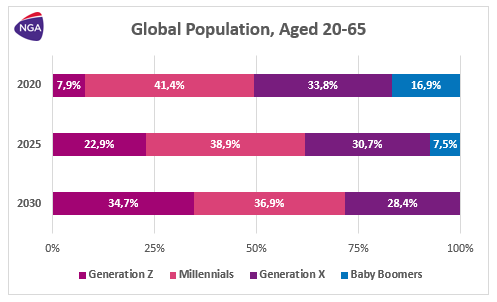The marketing and digital marketing industries has been obsessed with Millennials for the past two decades. In fact, a Google search currently yields around 129 million results for the search term “millennials”, compared to only around 7.2 million for the previous “generation x”.
But the millennials of today have outgrown their caricature as a bunch of entitled 20-somethings. The first millennials are now approaching their 40th birthday. While this age group still makes up a significant proportion of the audience of many marketers, some predictions made about their importance have fallen short of the mark.
For example, the oft-quoted statistic that Millennials will make up 75% of the workforce by 2025 is now not only unlikely but rather impossible.
It’s 2020 and Millennials have already peaked as a percentage of the adult population, making up just over 40% of the global population. By 2030 this percentage is expected to drop to just under 37% as Generation Z starts to come of age.

Generation Z consists of people who were born from 1995 to 2010. These young people have grown up in a digital world and have very different viewpoints than generations that came before them. They’re also more diverse than any other generation in history.
A more diverse audience can make content marketing challenging, but it also opens up more opportunities to reach different segments of that audience through personalization.
If you’ve been focusing your marketing strategy on Millennials, it may be time to take a step back and come up with some new ideas for reaching the workforce and decision-makers of tomorrow.
November 23, 2021

